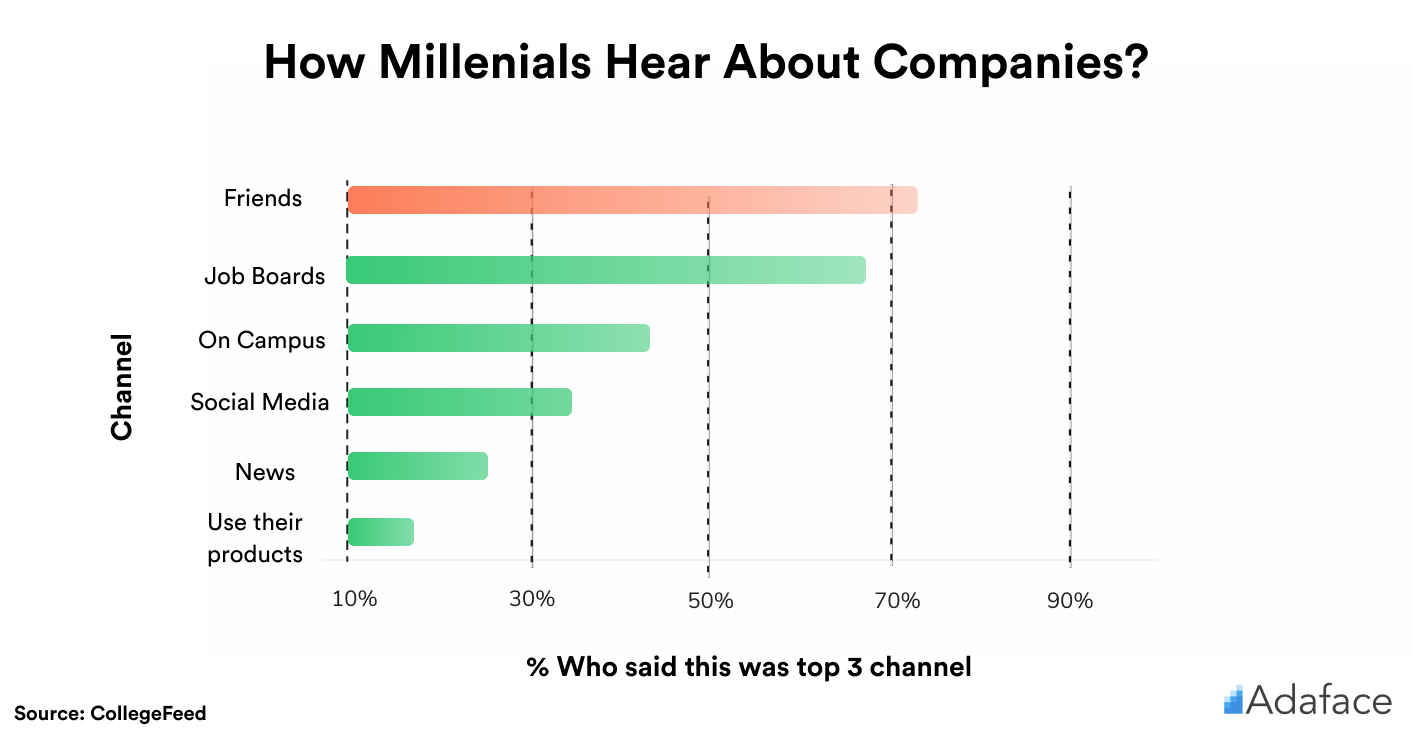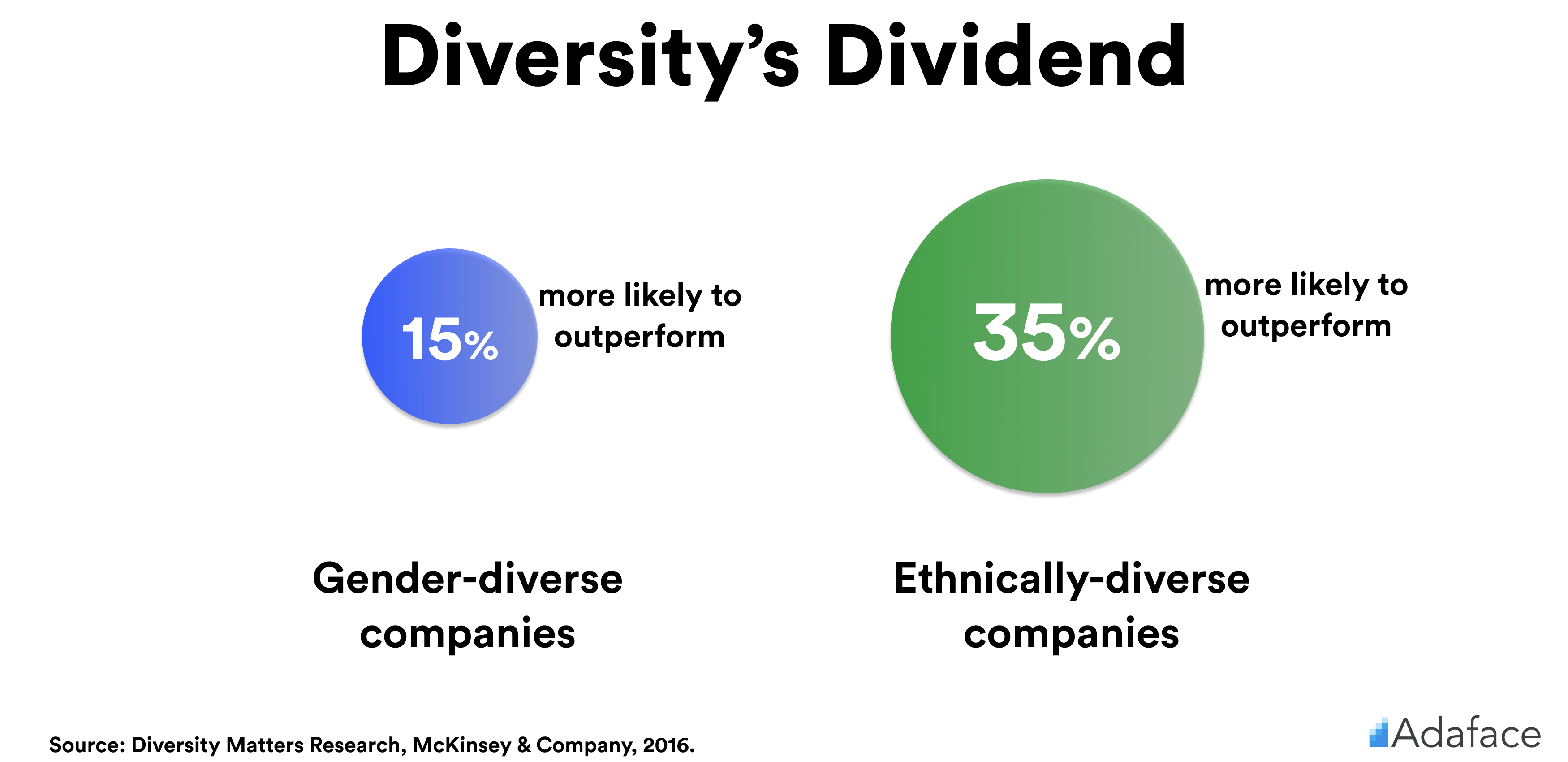
The rise in students and recent graduates applying to jobs seems to have no limit. Here, we introduce campus recruitment - one of the best ways for companies to hire candidates.
According to a study done by the Harvard Business Review, 72% of millennials hear about companies from friends, 68% from the job board, and 45% from on-campus recruiting events. If on-campus recruiting were to expand and reach all the students in the most popular category effectively, the recruiting process could be a lot better! The graph below shows that simply having a campus presence is not enough – companies have to promote a brand that appeals to Gen Z.

Companies that connect with students at target schools can develop their brand, shift to a data-driven hiring process, and create a positive candidate experience.
Here’s a sneak peek of the top techniques for attracting and engaging students:
- As a recruiter, extend your role to being a mentor while students are navigating their job search. This can entail meeting up for coffee and exchanging emails that are full of advice and resources. Connections go a long way!
- Build a website that focuses much attention on the application/recruiting process.
- Add extra benefits – surprise new hires with small care packages, personalized messages or gifts: a little gesture to show that your company cares about them.
- Maintain social media platforms to inform students of recruiting events and promote your company’s brand.
- Leave your email address and potentially even your phone number to demonstrate that you are available, easy to reach and ready to help.
Continue to read our ultimate guide to campus recruitment to learn more!
What is Campus Recruitment?
Campus recruitment is one of the most popular methods of interacting with university students and graduates who are interested in internships and full-time roles. The strategy is employed through a ton of different mediums, including campus career fairs, informational sessions, social media posts, and on-campus interviews. Campus recruitment heavily revolves around a company’s brand recognition and resources; in addition, on-campus recruiters are often looking for multiple hires at a time. Therefore, companies that recruit on campus tend to be relatively large or medium-sized. Employers that have an on-campus presence comprise a diverse set of industries, ranging from finance and consulting to manufacturing and engineering. Based on the industry, recruiters will be on campus at different times throughout the school year.
Partnering with universities to understand the best techniques to source candidates and creating an out-of-the-box recruitment strategy are the first steps in the process. These can happen both seasonally and year-round, often dependent upon which industry the employer is a part of. After engaging with its talent pool, a company should always analyze its recruiting performance and develop a plan for the next steps.
Campus recruitment creates a win-win situation for both the employer and the candidate – by engaging in a personalized experience and considering multiple facets of a role, both parties can find their best fit!
What Does A Campus Recruiter Do?

A campus recruiter has a whole list of roles. There is a lot more to the position than just finding people to hire:
- Understanding the demands of open roles.
- Maintaining communication with university/college career centers.
- Balancing financial budget with recruiting endeavors.
- Creating a calendar to keep track of which in-person and virtual events will be attended.
- Using technical knowledge of the industry and company to answer questions and gauge a student’s skill level.
- Building a brand through marketing materials, including presentations, flyers, and videos.
- Meeting with interested candidates for coffee chats.
- Facilitating the application and interview processes.
- Extending offers to new hires and subsequently onboarding them.
- Analyzing key performance metrics in order to gauge successes and failures for the future.
There are a lot of recruiting marketing companies that can assist recruiters behind the scenes in brand development. In addition, recruiters should always consult with employees in various departments to ensure consistency and knowledge of the company.
Importance of Campus Recruitment
Every year, more college students and recent graduates are on the hunt for an internship or entry-level position. With such a high percentage of people looking for a job, the competition in recruiting top talent only gets worse. The newest generation has the highest college enrollment and is subsequently the most educated set of individuals in the job market. Being qualified for multiple positions compels candidates to search for employers that not only have an open position but also meet high standards for work culture, exit opportunities, employer relationships/mentorships, etc.
In order to get ahead in the race for top talent, companies should consider campus recruitment. For a minute, put yourself in the shoes of a prospective employee - would you want to work with a company that treats you like another fish in the sea or would you rather be in a place where your boss is giving you personalized advice? Building in-person relationships and facilitating the recruitment process creates a positive brand image for potential hires.
What is the Campus Recruitment Process?
There are 4 key steps in the recruitment process:
1. Creating a talent pool
It is essential to narrow down a list of schools to recruit from. Recruiters should consider aspects such as geography and industry to target specific schools. Many consulting companies, for example, recruit from specific schools in the region of a specific office.
2. Engaging students
Recruiters must offer unique opportunities for interaction, specific to their company - with candidates’ eyes on so many companies, it is a “must” to employ out-of-the-box strategies to attract Generation Z individuals. Don’t just meet the standard expectation!
3. Extending offers
After the application and interviewing process, narrow down the top candidates and welcome them to the team! Facilitate the onboarding process and explain the benefits that will accompany the job.
4. Analyzing and evaluating performance metrics
Finally, recruiters should evaluate successes and failures from the whole process and understand where there is room for improvement or where there is little to no return on investment.
Advantages of Campus Recruitment
These days, almost every teenager and young adult is glued to their phone or laptop. For Generation Z, digitized services are an expectation rather than a convenience. According to a survey, “91% Of Generation Z said that technological sophistication would impact their interest in working at a company.” Digitizing the recruitment process is instrumental for a range of reasons:
1. Increased convenience for candidates
Applicants generally appreciate applications that are fast and simple to fill out. Having features such as a “one-click apply”, application status dashboard with updated messages and a mobile-friendly user design allows candidates to be informed every step of the way.

On LinkedIn, candidates are more inclined to apply to a job when they see that the “Easy Apply” option is available. With a one-click apply, candidates save time filling out long forms and, instead, simply have to upload their resumes and answer a few pre-employment questions.
2. Elevated efficiency
No one likes entering data into spreadsheets, cell by cell - the process just never ends! This is just one of the many tasks in the recruiting process that are considered “busy work” if completed manually. Time-consuming activities will be automated with digitization.
An important note - not all digitized processes are beneficial! Some companies use resume-processing software that can shortlist applicants based on specific keywords and GPAs. While this saves time, it can eliminate talented candidates that just look bad on paper and can subsequently provide the wrong information.
As an alternative way to be efficient, a job posting website such as LinkedIn or Handshake allows numerous candidates to be reached at a time. Having a single database where all information is stored eliminates the need to manually monitor data on a spreadsheet. For in-person recruiting, rather than being handed a paper resume, it could be beneficial to have an electronic version sent to a platform so that corresponding emails can be stored in one place.
3. Decreased costs
Costs associated with in-person recruiting and manual data analysis can be extremely high. Employers spend an average of $4,129 per hire in the United States. As mentioned previously, recruiters must create a budget for marketing and attending in-person events. Recruiters could significantly drive down costs by hosting virtual campus recruiting interviews, holding video interviews for shortlisted candidates, having a digitized analysis of key metrics, and marketing through social media.
4. Improved data-driven metrics
Recruiting metrics can help recruiters monitor the effectiveness of multiple strategies. It is essential to have insight as to which techniques should be expanded, improved upon, or eliminated. Read the next section, “Campus Recruiting Metrics” to learn about some of the most data measures to consider!
Key Campus Recruiting Metrics
With so many different strategies being employed in the recruitment process, it becomes hard to track what methods are corresponding to successful results. According to recent research in the Harvard Business Review, “only about a third of U.S. companies report that they monitor whether their hiring practices lead to good employees”. In order to make sure the high cost of recruiting leads to a valuable return, there are a lot of things that must be monitored. Here are some questions to ask when recording and evaluating recruitment data:
- What campus events were attended?
- Out of the number of individuals reached, how many completed the application?
- Where are your hires from?
- From each school, how many qualified candidates applied?
- How did your hires apply to your company (campus resume drop, job-posting website)?
- Who engaged with social media posts?
- How many impressions did the career section of the company website have?
- How long did the average application take to complete?
- How long, on average, did the entire hiring process take?
- How much money was spent on each hire?
- What is the retention rate of newer employees?
These are only some of the many performance indicators that can be tracked throughout the process. Understanding growth opportunities and areas of low return for the future will ensure that resources are being invested in the right places!
Campus Recruitment Challenges
Campus Recruitment still remains a big challenge to the organizations. With the expecting more from the candidates in terms of their capabilities, professional attitude, industry specific domain knowledge and to their commitment levels, the organizations are now left with fewer qualified candidates. The global economic downturn has greatly affected the number of students who are placed through on-campus recruitment. Organizations now focus more on visiting the campuses that are reputed for their quality education and placements.
After hiring brand new employees or interns and facilitating the onboarding process, recruiters still have some work left to do. It is extremely important to constantly monitor the needs of new hires throughout the time they are working. If an employee leaves the company after a few years of working, it is important to understand why. This insight will allow employers to increase their employee retention rate in the future while improving the workplace as a whole.
Here are some strategies to streamline your campus recruitment efforts:
Don’t focus all your resources on top-tier schools
Season 1, Episode 2 of The Office: “Diversity Day” - even through the comedic undertones of a sitcom, we see the importance of diversity in a healthy workplace. Recruiters should look into historically black universities or colleges with underrepresented groups, as they often have students with exceptional skills as well as diverse perspectives and backgrounds.

Research conducted by McKinsey shows that gender-diverse companies and ethnically diverse companies in the top quartile for diversity outperform other companies by 15% and 35%, respectively.
Hiring primarily from top-tier schools is also competitive. Students that are extremely skilled in their field or have access to more resources may already have their eyes on one or two companies that they are bound to get an offer at. Suppose that top-tier recruits do join your company - the problem is that the attrition rate is very high. These hires are more likely to switch to another job in a shorter period of time due to the fact that other companies are always scouting them. Hiring top students from a variety of different schools will inevitably create longer commitments.
Don’t go off a candidate’s resume

A resume is fundamentally just a piece of paper. An individual’s skillset, backgrounds, and experiences extend past words on a page. In addition, many people lie on their resume to stand out. According to an employment screening report from 2017, 85% of employers caught candidates lying on their application (a 19% increase from 2012). Give candidates a chance to interview, submit a video introduction, or take skill-based tests so they can showcase their talents.
Don’t stick to a script
While it’s always good to be prepared, make sure you are making genuine connections with the people you meet. Not only will the candidate appreciate and remember the conversation, but you can also get an idea of who could be a good fit for the company. According to a study, 75% of Gen Z workers say it's important to have a boss who can coach employees. If you are approachable as a recruiter, candidates will seek your guidance and associate strong mentorship with the company’s image.
Stay on touch
It is essential to maintain the connections made during any campus recruiting events. Recruiters should always keep close ties to college career centers for future years. Additionally, recruiters should continue to check in on previous applicants to see if they would like to re-apply for a position in the company or gain any kind of mentorship. Maintaining close connections with alumni also goes a long way. Alumni will pass on their experiences to juniors and the cycle will continue on. Therefore, maintaining a relationship with campus hires can lead to even better hires the following year!
Campus Recruiting Tools
There are various types of tools available in the market to help organizations with their campus recruitment. These tools help the organizations to identify and assess the skills of the students and their potential to be successful in the organization.
Benefits of using a campus recruiting tool:
- It helps to identify the top talent from the campuses.
- It provides a pool of qualified candidates for the organizations to choose from.
- It helps to save time and resources that would otherwise be spent on visiting each campus.
- It helps to assess the students on various parameters such as their skills, knowledge, attitude, etc.
- It provides an opportunity for the organizations to interact with the students and get to know them better.
Looking for a campus recruitment software for your hiring needs? Check out Adaface.

Content Marketer at Adaface
Spending too much time screening candidates?
We make it easy for you to find the best candidates in your pipeline-
with a 40 min skills test.


